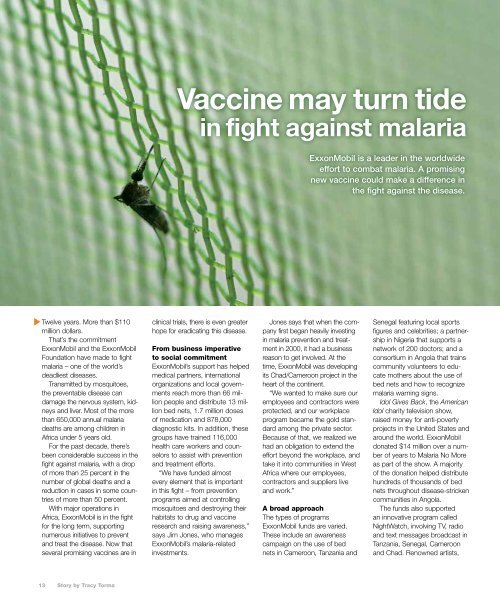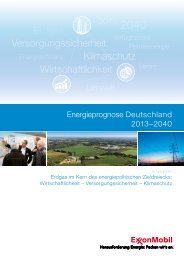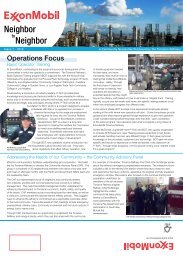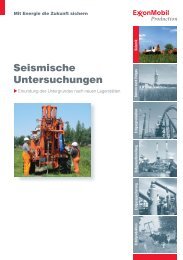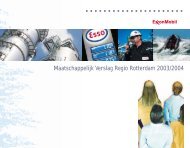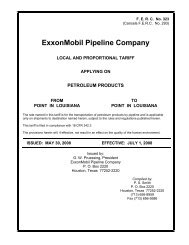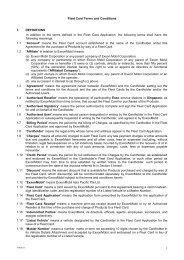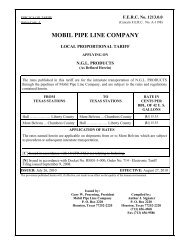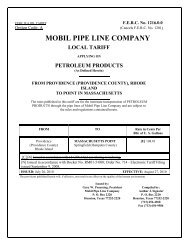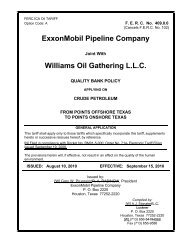2012 — Number 1 - ExxonMobil
2012 — Number 1 - ExxonMobil
2012 — Number 1 - ExxonMobil
Create successful ePaper yourself
Turn your PDF publications into a flip-book with our unique Google optimized e-Paper software.
Twelve years. More than $110<br />
million dollars.<br />
That’s the commitment<br />
<strong>ExxonMobil</strong> and the <strong>ExxonMobil</strong><br />
Foundation have made to fight<br />
malaria – one of the world’s<br />
deadliest diseases.<br />
Transmitted by mosquitoes,<br />
the preventable disease can<br />
damage the nervous system, kidneys<br />
and liver. Most of the more<br />
than 650,000 annual malaria<br />
deaths are among children in<br />
Africa under 5 years old.<br />
For the past decade, there’s<br />
been considerable success in the<br />
fight against malaria, with a drop<br />
of more than 25 percent in the<br />
number of global deaths and a<br />
reduction in cases in some countries<br />
of more than 50 percent.<br />
With major operations in<br />
Africa, <strong>ExxonMobil</strong> is in the fight<br />
for the long term, supporting<br />
numerous initiatives to prevent<br />
and treat the disease. Now that<br />
several promising vaccines are in<br />
13 Story by Tracy Torma<br />
Vaccine may turn tide<br />
in fight against malaria<br />
clinical trials, there is even greater<br />
hope for eradicating this disease.<br />
From business imperative<br />
to social commitment<br />
<strong>ExxonMobil</strong>’s support has helped<br />
medical partners, international<br />
organizations and local governments<br />
reach more than 66 million<br />
people and distribute 13 million<br />
bed nets, 1.7 million doses<br />
of medication and 878,000<br />
diagnostic kits. In addition, these<br />
groups have trained 116,000<br />
health care workers and counselors<br />
to assist with prevention<br />
and treatment efforts.<br />
“We have funded almost<br />
every element that is important<br />
in this fight – from prevention<br />
programs aimed at controlling<br />
mosquitoes and destroying their<br />
habitats to drug and vaccine<br />
research and raising awareness,”<br />
says Jim Jones, who manages<br />
<strong>ExxonMobil</strong>’s malaria-related<br />
investments.<br />
<strong>ExxonMobil</strong> is a leader in the worldwide<br />
effort to combat malaria. A promising<br />
new vaccine could make a difference in<br />
the fight against the disease.<br />
Jones says that when the company<br />
first began heavily investing<br />
in malaria prevention and treatment<br />
in 2000, it had a business<br />
reason to get involved. At the<br />
time, <strong>ExxonMobil</strong> was developing<br />
its Chad/Cameroon project in the<br />
heart of the continent.<br />
“We wanted to make sure our<br />
employees and contractors were<br />
protected, and our workplace<br />
program became the gold standard<br />
among the private sector.<br />
Because of that, we realized we<br />
had an obligation to extend the<br />
effort beyond the workplace, and<br />
take it into communities in West<br />
Africa where our employees,<br />
contractors and suppliers live<br />
and work.”<br />
A broad approach<br />
The types of programs<br />
<strong>ExxonMobil</strong> funds are varied.<br />
These include an awareness<br />
campaign on the use of bed<br />
nets in Cameroon, Tanzania and<br />
Senegal featuring local sports<br />
figures and celebrities; a partnership<br />
in Nigeria that supports a<br />
network of 200 doctors; and a<br />
consortium in Angola that trains<br />
community volunteers to educate<br />
mothers about the use of<br />
bed nets and how to recognize<br />
malaria warning signs.<br />
Idol Gives Back, the American<br />
Idol charity television show,<br />
raised money for anti-poverty<br />
projects in the United States and<br />
around the world. <strong>ExxonMobil</strong><br />
donated $14 million over a number<br />
of years to Malaria No More<br />
as part of the show. A majority<br />
of the donation helped distribute<br />
hundreds of thousands of bed<br />
nets throughout disease-stricken<br />
communities in Angola.<br />
The funds also supported<br />
an innovative program called<br />
NightWatch, involving TV, radio<br />
and text messages broadcast in<br />
Tanzania, Senegal, Cameroon<br />
and Chad. Renowned artists,


